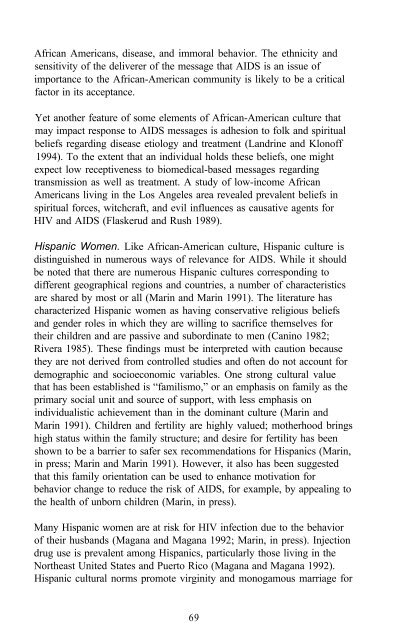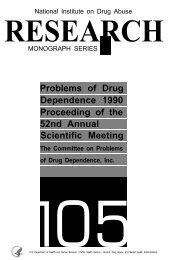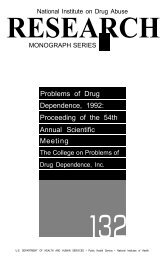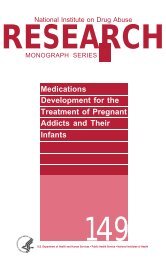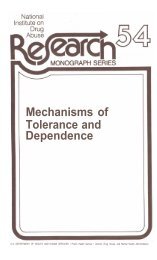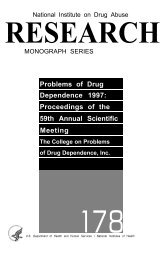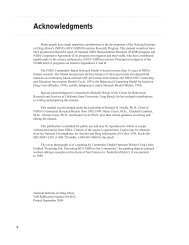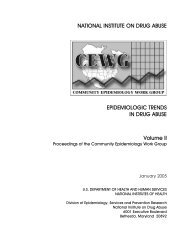The Context of HIV Risk Among Drug Users and Their Sexual Partners
The Context of HIV Risk Among Drug Users and Their Sexual Partners
The Context of HIV Risk Among Drug Users and Their Sexual Partners
You also want an ePaper? Increase the reach of your titles
YUMPU automatically turns print PDFs into web optimized ePapers that Google loves.
African Americans, disease, <strong>and</strong> immoral behavior. <strong>The</strong> ethnicity <strong>and</strong><br />
sensitivity <strong>of</strong> the deliverer <strong>of</strong> the message that AIDS is an issue <strong>of</strong><br />
importance to the African-American community is likely to be a critical<br />
factor in its acceptance.<br />
Yet another feature <strong>of</strong> some elements <strong>of</strong> African-American culture that<br />
may impact response to AIDS messages is adhesion to folk <strong>and</strong> spiritual<br />
beliefs regarding disease etiology <strong>and</strong> treatment (L<strong>and</strong>rine <strong>and</strong> Klon<strong>of</strong>f<br />
1994). To the extent that an individual holds these beliefs, one might<br />
expect low receptiveness to biomedical-based messages regarding<br />
transmission as well as treatment. A study <strong>of</strong> low-income African<br />
Americans living in the Los Angeles area revealed prevalent beliefs in<br />
spiritual forces, witchcraft, <strong>and</strong> evil influences as causative agents for<br />
<strong>HIV</strong> <strong>and</strong> AIDS (Flaskerud <strong>and</strong> Rush 1989).<br />
Hispanic Women. Like African-American culture, Hispanic culture is<br />
distinguished in numerous ways <strong>of</strong> relevance for AIDS. While it should<br />
be noted that there are numerous Hispanic cultures corresponding to<br />
different geographical regions <strong>and</strong> countries, a number <strong>of</strong> characteristics<br />
are shared by most or all (Marin <strong>and</strong> Marin 1991). <strong>The</strong> literature has<br />
characterized Hispanic women as having conservative religious beliefs<br />
<strong>and</strong> gender roles in which they are willing to sacrifice themselves for<br />
their children <strong>and</strong> are passive <strong>and</strong> subordinate to men (Canino 1982;<br />
Rivera 1985). <strong>The</strong>se findings must be interpreted with caution because<br />
they are not derived from controlled studies <strong>and</strong> <strong>of</strong>ten do not account for<br />
demographic <strong>and</strong> socioeconomic variables. One strong cultural value<br />
that has been established is “familismo,” or an emphasis on family as the<br />
primary social unit <strong>and</strong> source <strong>of</strong> support, with less emphasis on<br />
individualistic achievement than in the dominant culture (Marin <strong>and</strong><br />
Marin 1991). Children <strong>and</strong> fertility are highly valued; motherhood brings<br />
high status within the family structure; <strong>and</strong> desire for fertility has been<br />
shown to be a barrier to safer sex recommendations for Hispanics (Marin,<br />
in press; Marin <strong>and</strong> Marin 1991). However, it also has been suggested<br />
that this family orientation can be used to enhance motivation for<br />
behavior change to reduce the risk <strong>of</strong> AIDS, for example, by appealing to<br />
the health <strong>of</strong> unborn children (Marin, in press).<br />
Many Hispanic women are at risk for <strong>HIV</strong> infection due to the behavior<br />
<strong>of</strong> their husb<strong>and</strong>s (Magana <strong>and</strong> Magana 1992; Marin, in press). Injection<br />
drug use is prevalent among Hispanics, particularly those living in the<br />
Northeast United States <strong>and</strong> Puerto Rico (Magana <strong>and</strong> Magana 1992).<br />
Hispanic cultural norms promote virginity <strong>and</strong> monogamous marriage for<br />
69


